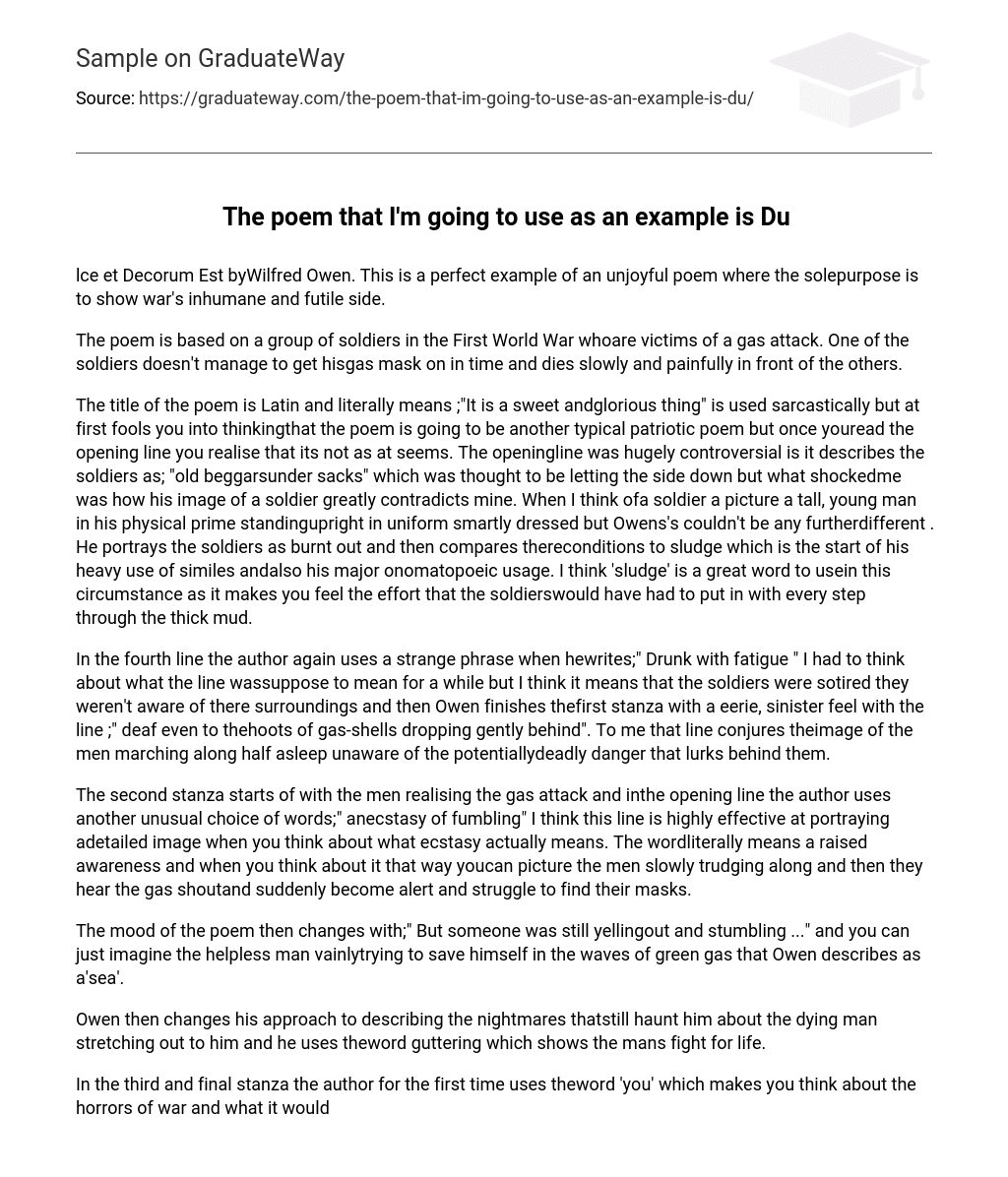lce et Decorum Est byWilfred Owen. This is a perfect example of an unjoyful poem where the solepurpose is to show war’s inhumane and futile side.
The poem is based on a group of soldiers in the First World War whoare victims of a gas attack. One of the soldiers doesn’t manage to get hisgas mask on in time and dies slowly and painfully in front of the others.
The title of the poem is Latin and literally means ;”It is a sweet andglorious thing” is used sarcastically but at first fools you into thinkingthat the poem is going to be another typical patriotic poem but once youread the opening line you realise that its not as at seems. The openingline was hugely controversial is it describes the soldiers as; “old beggarsunder sacks” which was thought to be letting the side down but what shockedme was how his image of a soldier greatly contradicts mine. When I think ofa soldier a picture a tall, young man in his physical prime standingupright in uniform smartly dressed but Owens’s couldn’t be any furtherdifferent . He portrays the soldiers as burnt out and then compares thereconditions to sludge which is the start of his heavy use of similes andalso his major onomatopoeic usage. I think ‘sludge’ is a great word to usein this circumstance as it makes you feel the effort that the soldierswould have had to put in with every step through the thick mud.
In the fourth line the author again uses a strange phrase when hewrites;” Drunk with fatigue ” I had to think about what the line wassuppose to mean for a while but I think it means that the soldiers were sotired they weren’t aware of there surroundings and then Owen finishes thefirst stanza with a eerie, sinister feel with the line ;” deaf even to thehoots of gas-shells dropping gently behind”. To me that line conjures theimage of the men marching along half asleep unaware of the potentiallydeadly danger that lurks behind them.
The second stanza starts of with the men realising the gas attack and inthe opening line the author uses another unusual choice of words;” anecstasy of fumbling” I think this line is highly effective at portraying adetailed image when you think about what ecstasy actually means. The wordliterally means a raised awareness and when you think about it that way youcan picture the men slowly trudging along and then they hear the gas shoutand suddenly become alert and struggle to find their masks.
The mood of the poem then changes with;” But someone was still yellingout and stumbling …” and you can just imagine the helpless man vainlytrying to save himself in the waves of green gas that Owen describes as a’sea’.
Owen then changes his approach to describing the nightmares thatstill haunt him about the dying man stretching out to him and he uses theword guttering which shows the mans fight for life.
In the third and final stanza the author for the first time uses theword ‘you’ which makes you think about the horrors of war and what it wouldbe like for you to be there yourself and experience the suffering that somany millions of young men went through.
The lines that most impressed me were;” If you could hear, at everyjolt, the blood come gargling from the froth-corrupted lungs” in theselines Owen has used punctuation so as you are reading you can feel thejerks and the jolts of the blood spilling from the poor mans lungs .
The poem then finishes of with its most controversial line;” The oldlie:Dulce et Decorum est Pro Patria mori” It is a sweet and glorious thingto die for your country. This is what the whole poem is building up to.
Through the stanzas he has been showing us how there is nothing glorious indying horribly but in fact it is a pointless waste of young life and thepeople who conjured these patriotic thoughts in young minds aresurprisingly enough not the cannon-fodder on the front lines but safe athome.
The more I read this poem the more I respect Owens talent for writingbecause there is not one word in the poem that has not been thought throughand every word serves a purpose. The author even uses punctuation to servea purpose e.g. In the first stanza he uses commas and semi-colons to givethe feeling of the men limping and also in the first stanza he usesalliteration of the letter s to symbolize the gas escaping from the shell.
All round I think this is a great poem that isn’t romanticised at allbut still is highly effective in giving you a honest portrayal of whattrench war fare must have been like for the millions of young life’s itaffected.
Brendan McGillen





